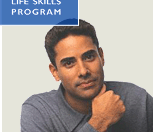
The Life Skills Educator Training Program (LSETP) is a three day intensive experience which provides counselors, teachers and administrators with an opportunity to observe, learn and practice the skills necessary to conduct the Adkins Career Program, formally known as the Adkins Life Skills Program: Career Development Series. Trainees also have an opportunity to plan the administrative tasks necessary to install the Adkins Program or establish a functioning Career Development Center, or a Life Skills Learning Laboratory in their agency.
This training program is essential for running the Life Skills Program and the Adkins Program cannot be obtained unless staff are trained. It has been rated by most graduates as "excellent", "very valuable" "very enjoyable." A significant number of the graduates have considered the training program as "one of the best and most professional educational experiences I have had."
Training is conducted in small groups and makes use of video feedback and group learning processes as well as specifically designed learning activities. As such it is similar in process to the program they are being trained to use.
The training program deals with such areas as:
- The theory, basic concepts and methods of Career Development, the Adkins Life Skills Program Model, the Four-stage Structured Inquiry Learning Process and the dynamics of groups
- The characteristics of unemployed, underemployed, unemployable and economically disadvantaged learners
- The objectives of the Adkins Career Program and the organization and instructional content of the ten learning units.
- The teaching and counseling functions required of the Life Skills Educator in each of the four-stages of the learning process.
- The role of the learners as they pass through each of the four stages.
- Group processes and group management skills. This includes how to establish learning contracts and use them effectively to help create and maintain a positive learning environment.
- Tailoring and individualizing the units to the needs of specific groups and individuals in different geographical areas
- Localizing the resource materials in the units.
- Integrating individual counseling with the Adkins Program's group approach.
- The administration of alternative delivery systems and various scheduling patterns.
- The operation of the audio/visual equipment used in the Career Development Series.
In order to achieve these objectives, the trainees are exposed to both theoretical and experiential learning experiences through such activities as: multi-media presentations, group discussions, readings, role-playing, modeling, and behavioral rehearsal. They practice conducting the stages of the Adkins Life Skills Four-Stage Structured Inquiry Model in which they lead discussions to elicit ideas from students, coach students through, for example, role playing and presentation activities and conduct simulations where student demonstrate what they have learned. Many of these activities are videotaped, so trainees can evaluate their own and others' performances. Trainees also participate in administrative planning sessions where they develop a tentative delivery plan and schedule for their agency. They also learn how to evaluate and give sensitive feedback to students about their performances and practice using video equipment for that purpose and for the presentation of materials.
Life Skills Educator Training is normally conducted in New York, frequently at Teachers College, Columbia University. By special arrangement it can be conducted on-site at any place in the USA or Canada.
The following is a typical schedule for two of the three days of the training program.
Day 1: 9:00 - 5:00 P.M.
- Welcome, Introduction and Orientation, Creating a Positive Group Learning Environment
- Theory and Rationale of the Life Skills Program--Issues of Client Need and Principles of Learning
- What the Ten Units Cover--The Skills of Planning one's Future, Getting Jobs and Choosing and Preparing for a Career
- The Four-Stage Structured Inquiry Learning Model--The Processes of Affective, Cognitive and Behavioral Learning
- The Career Counseling Process
- Unit Exploration Workshop
Day 2: 9:00 - 5:00 P.M.
- Introduction to Stimulus and Evocation: Posing the Problems and Dignifying the Learner
- Evocation: Demonstration of Inductive Learning Processes and Outcomes
- Evocation: Analysis of Skills
- Evocation: Practice and Video Feedback
- Objective Inquiry: Skills for Acquiring Knowledge and Transforming it into Usable Behavior
Day 3: (Schedule somewhat flexible depending upon the needs of the group,) but includes:
- The Application Stage: The Demonstration of Competence
- Presentation/Demonstration of the Four-Stages of a Learning Unit;
- Career Development and Counseling Issues
- Counseling, Referrals and the Identification of Community Resources
- Administrative Issues Such As Delivery Patterns, Scheduling, Recruitment and Job Placement
[ TOP ] |
 |


